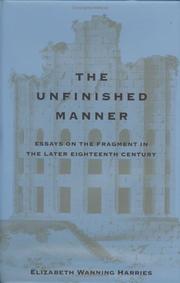Check nearby libraries
Buy this book

The Unfinished Manner examines the fragments produced by European writers and artists in the eighteenth century and earlier, fragments that were not the result of an inability to finish either texts or buildings but rather deliberate refusals to make the traditional gestures of conclusion. Most books published in the past few years on the fragment and the unfinished see it as a peculiarly "Romantic" early nineteenth-century exclusively poetic form.
Elizabeth Wanning Harries argues, instead, that the fragment not only had a long history beginning with Petrarch but also played an important part in the history of the novel and other kinds of prose.
Conceptualizing the fragment as a genre, Harries sheds a new light on the practice of reading fiction and "reading" ruins in the eighteenth century, complex practices that often require oscillation between two perspectives or ways of reading.
She also explores the gendering of forms in eighteenth-century aesthetics - the perception of fragments as feminine (beautiful) rather than masculine (sublime) - and speculates on the fragment's meaning within the context of eighteenth-century social mythologies as well as those of later eras. Finally, she rereads Coleridge's "Kubla Khan" to show its roots in eighteenth-century fragmentary textual practices.
.
The Unfinished Manner takes up the questions that arise when writers and artists treat apparently unfinished forms - fragments, ruins, torsos, sketches - as finished, both in the eighteenth century and, implicitly, today.
Harries's treatments of Petrarch as the initiator of the fragment tradition, of Sterne in relation to biblical criticism, of Coleridge's "Kubla Khan" in relation to Sterne's Tristram Shandy, and of fragments in their relation to the feminine are original and revisionary contributions that seriously challenge some critical assumptions about Romanticism and its relationship to eighteenth-century texts.
Check nearby libraries
Buy this book

Previews available in: English
| Edition | Availability |
|---|---|
|
1
The unfinished manner: essays on the fragment in the later eighteenth century
1994, University Press of Virginia
in English
0813915023 9780813915029
|
aaaa
Libraries near you:
WorldCat
|
Book Details
Edition Notes
Includes bibliographical references (p. 197-210) and index.
Classifications
The Physical Object
ID Numbers
Community Reviews (0)
Feedback?| 5 hours ago | Edited by MARC Bot | import existing book |
| February 17, 2024 | Edited by ImportBot | import existing book |
| December 4, 2010 | Edited by Open Library Bot | Added subjects from MARC records. |
| April 28, 2010 | Edited by Open Library Bot | Linked existing covers to the work. |
| December 10, 2009 | Created by WorkBot | add works page |










